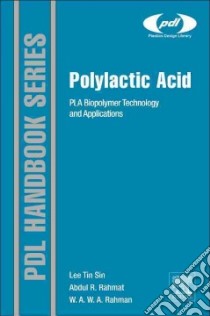- Libreria
- >
- Libri in lingua
- >
- Chimica
- >
- Chimica industriale
Polylactic Acid - 9781437744590
Un libro in lingua di Sin Lee Tin Rahmat Abdul Razak Rahman Wan Aizan Wan Abdul edito da William Andrew Pub, 2012
- € 221.90
- Il prezzo è variabile in funzione del cambio della valuta d’origine
Polylactic Acid is the first viable thermoplastic that can be produced from a plant-based feedstock such as corn or sugar cane, and yet be processed by the conventional melt processing technologies. In the same time Polylactic Acid is produced at the largest industrial scale of all biodegradable polymers. It is being used in biomedical applications for a decade to fabricate artificial bones, scaffolds, sutures or drug carriers for surgery purposes. PLA is one of the components of the new Coca-Cola PlantBottle™ launched in May 2009, while 100% PLA is being used for bottled water brands such as Primo and Keystone Water Co. PLA is also used in compostable food packaging by companies as diverse as Newman's Own Organics, Wild Oats, Wal-Mart, Del Monte and Kentucky Fried Chicken. It is also being evaluated as a material for tissue engineering.
Mass production tremendously reduces the cost of PLA production to a level sufficient for fabrication of domestic containers, plastic bags, and fibers. For example, Cargill and Teijin have formed NatureWorks, LLC which has just built a second commercial-scale plant with millions-of-kilogram capacity. There is a great deal of public interest in replacement of petroleum-based plastics with PLA. In spite of the interest, there is no single reference book where the essential PLA material, processing and application information have been collected.
In Polylactic Acid the authors provide knowledge of basic PLA technologies and prepare the reader to proceed to the next higher level of research and development stage. The current market situation for PLA and biodegradable polymers is described as well as the mechanical, chemical, thermal, rheology, and degradation properties of PLA. Finally, applications of PLA with the respective brands have been examined for this book.
- An essential reference for engineers, scientists and product designers that already work with polymers and plastics who wish to convert to a sustainable plastic.
- Covers the properties, synthesis and polymerization of PLA and processing techniques involved in fabricating parts from this polymer.
- With growth in the biopolymers sector running at over 15% a year, this is the only definitive handbook on this PLA.
Informazioni bibliografiche
- Titolo del Libro in lingua: Polylactic Acid
- Lingua: English
- Autori : Sin Lee Tin Rahmat Abdul Razak Rahman Wan Aizan Wan Abdul
- Editore: William Andrew Pub
- Collana: William Andrew Pub (Hardcover)
- Data di Pubblicazione: 21 Novembre '12
- Genere: TECHNOLOGY and ENGINEERING
- ISBN-10: 1437744591
- EAN-13: 9781437744590


